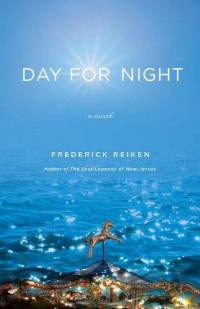 Day for Night
Day for Night
by Frederick Reiken
Reagan Arthur Books, 2010
352 pages / $14.99 Buy from Powell’s
Rating: 7.0
It may be argued that a linked set of stories, or story cycle, presented under the unifying banner of a novel, hews closer to the truth of that nature which art seeks to replicate, than the more traditional novel form could achieve. The set of linked stories paints a broader portrait of its subject, in all the disjointedness of the life its mirrored surface reflects. Or so one would hope, when making the argument. Otherwise, why bother to call it a novel at all? Why not just publish a set of stories as stories, as so many others have done, and allow the reader to discover the connections for himself? Ignoring, or course, the disparity in demand for novels versus story collections.
In Day for Night, Frederick Reiken’s novel of linked stories, the form is ably rendered, for the most part. Reiken is obviously a sensitive, observant writer, armed with a good ear and a deft hand, for the most part. He tells two stories, essentially, one of a family shattered by the Holocaust, and another of the children of a diseased family who are rescued by a legendary figment sought by the FBI.
Ignoring a few technical questions (ambiguity over his definition of “bemused,” for example, the context of which is inexact), and a few embarrassingly trite expressions (albeit voiced by fallible characters they are inexcusable: “I had never seen creatures more beautiful in my life”), the reader, progressing through the novel, begins to wonder more and more at certain choices of construction. Indeed, the reader is primed to circumspection from the start, wondering why this novel was constructed as it was. Thereafter, the reader begins to ask why—why is the novel relayed in this way, why are some stories told the way they’re told, why are some stories told at all.
At first glance, the stories would appear to have little to do with one another, aside from certain philosophical ponderings of the actors and the dubious intersections of their lives—a manatee tour guide who plays in a rock band; a marine biologist characterized by her own daughter as a slut. Nevertheless, the stories do draw the reader in, and Reiken achieves reverberation, both emotional and philosophical, with dexterity. And yet the beauty of his equation is sullied by the occasional cheat, most egregiously when the children of protagonists are enlisted to elaborate on their parents’ arcs. If those stories existed independently, free of the novel’s smothering aegis, they would justify themselves. Shackled to the whole, they leave the reader impatient, or confused, unable to discern what is important and what isn’t.
And here is the problem of the superior mirror to nature. In nature, everything is important, simply on the merit of being fit enough to survive and co-evolve with the rest of us. That’s one of the reasons the world is so confusing and chaotic and beautiful—everything is important, and there’s too much of it to know completely. Art, however, can shed light on the darkness of chaos by rendering the world in comprehensible order, but just messy enough to give us the hint, or vice versa. Reiken exerts himself to suggest a great mystery, or a number of them, but his attempt to do so with only the ostensible unity of the word “novel” leaves one wondering if there is any solution to the mystery, or if it is worth the effort to search. These frustrations aside, as well as others presented by the novel, it is book worth reading, for the parts, if not the whole.
Tags: Day for Night, Frederick Reiken

I haven’t read this book, but from the sounds of it I have read a very similar one called AUSTIN NIGHTS (http://www.amazon.com/Austin-Nights-ebook/dp/B004M8S60C), and I love it. I’m almost tempted to say this novel, like DAY FOR NIGHT, is worth reading for the parts, if not the whole, but I think herocious mixes structure and content in such a way as to allow for much more fruitful introspection. What I mean is, not only does AUSTIN NIGHTS hint at a great mystery, but it also gets the reader to seek it out. And if a neat solution is not reached in the end, the unpredictable adventure along the way will more than make up for it.
But I’m going to read DAY FOR NIGHT to see how these two novels really compare and get back to you.